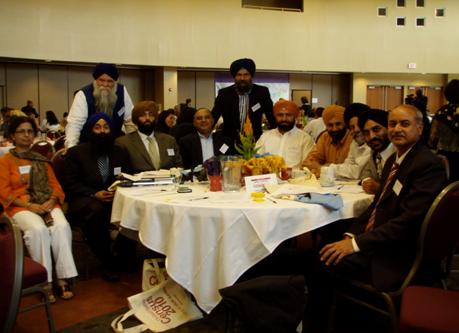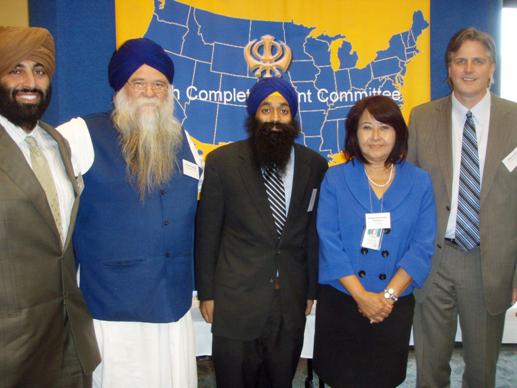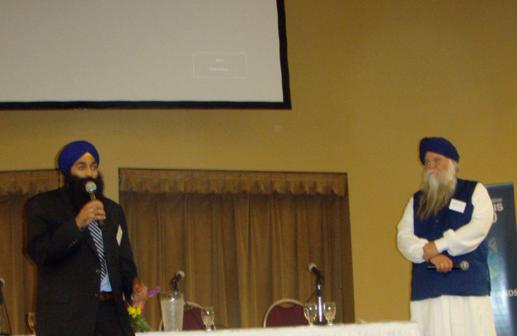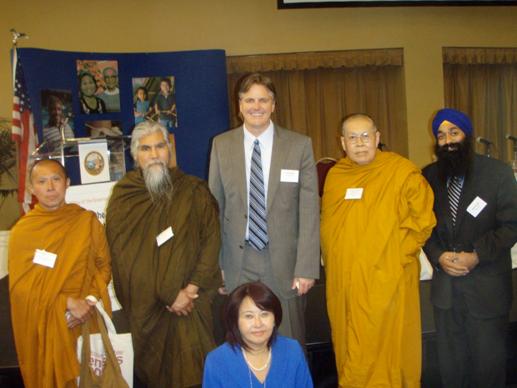San Diego, CA, USA: The Sikh community of San Diego and Imperial Counties joined hands with UNITED SIKHS to launch an effort to count Sikhs separately in the US Census on August 19th. Speaking at a Regional State Convening Event in San Diego that was organized by Governor Arnold Schwarzenegger's Office and co-sponsored by the Sikh Complete Count Committee of Southern California, Sikh community representatives expressed their concerns about how Sikhs have not been counted by the Census to date, and how Sikhs should be enumerated. UNITED SIKHS is filing a petition with the national US Census Bureau requesting proper tabulation of Sikhs when they mark "Other" and write in "Sikh," and is organizing Sikh Complete Count Committees in states with major Sikh populations around the country to ensure maximum write-ins to support the need to be counted.
The Census, Constitutionally mandated to be taken every ten years, is used by government for a variety of reasons, including how congressional seats are reapportioned, legislative districts are drawn, and how a large portion of federal funds are spent. It also is used, as most of the general public is not aware, by the federal government to monitor and enforce compliance with civil rights statutes, including voting, employment, housing, lending, education and anti-discrimination laws. The accuracy of the census directly affects the nation's ability to ensure equal representation and equal access to important governmental resources for all Americans. The request by the Sikh community to be counted correctly is based on similar public opinion expressed in public hearings on the Census to the Office of Management and Budget (OMB) at the White House, where public opinion emphasized the importance of self identification along with the need for correct tabulation to monitor and prove discrimination in political or social access. Jaspreet Singh, Staff Attorney, UNITED SIKHS, commented, "It is in the interest of the Government and the American people to correctly count all people that make up the diverse fabric of America. Public hearings on the Census previously showed that the public wants their specific communities to be counted, and the Sikh community is no different."

Representatives of the Sikh Community of San Diego and Imperial Counties (from left to right) Rosey Kaur, Jaspreet Singh, Niranjan Singh, Jesse Singh, Harminder Singh, Arvinder Singh, Amritpal Singh, Nirmal Singh, Ranbir Singh, Paul Singh, and Baljit Singh
UNITED SIKHS has been in detailed discussions with the U.S. Census Bureau and has been informed that, even if a Sikh marks "other" and writes in "Sikh," the write in is automatically tabulated and coded as "Asian Indian." While many other communities are able to ask for special disaggregation and receive data specific to their community after the Census is completed, data about Sikhs is not disaggregated separately. Sikhs have been in America for over 130 years, and have a rich history spanning the nation. Rough estimates place the Sikh population of California at 200,000, and the entire population of Sikhs in America between 400,000-1,000,000. While speaking about the effort, Niranjan Singh Khalsa, representing the California Sikh Council commented, "For the first time in America, the entire Sikh community is going to make a dedicated effort to engage in this very important effort, and have every Sikh counted in the 2010 Census."

(From left) Jesse Singh, Niranjan Singh, Jaspreet Singh, Nampet Panichpant-Michelsen, and James Christy
UNITED SIKHS has been in detailed discussions with the U.S. Census Bureau and has been informed that, even if a Sikh marks "other" and writes in "Sikh," the write in is automatically tabulated and coded as "Asian Indian." While many other communities are able to ask for special disaggregation and receive data specific to their community after the Census is completed, data about Sikhs is not disaggregated separately. Sikhs have been in America for over 130 years, and have a rich history spanning the nation. Rough estimates place the Sikh population of California at 200,000, and the entire population of Sikhs in America between 400,000-1,000,000. While speaking about the effort, Niranjan Singh Khalsa, representing the California Sikh Council commented, "For the first time in America, the entire Sikh community is going to make a dedicated effort to engage in this very important effort, and have every Sikh counted in the 2010 Census."

Jaspreet Singh and Niranjan Singh presenting the Sikh request to be counted separately
According to Professor Bruce LaBrack, a professor who has written extensively on the Sikh community, Sikhs have been recognized as an ethnicity in more than 60 countries worldwide, and the Census should support self-identification of people. Sikhs have a common literature, language, faith, and a distinct identity, among many other qualifiers that make the Sikh community a distinct and recognizable community. Post 9/11, the lack of awareness about Sikhs proved dangerous for the community as Sikhs were wrongly identified as "terrorists," due to their unique identity and many Sikhs have been targets of hate crimes, bullying, racial profiling, and in some cases police brutality.

Jaspreet Singh, James Christy, and Nampet Panichpant-Michelsen with representatives of the Laos community of Southern California
At the event, James Christy, Regional Director, Los Angeles Regional Office for the U.S. Census Bureau expressed concern over the tabulation of Sikhs and said that he would investigate the matter at the national office. He also commented that this Census, being the first after 9/11, is a particularly important census for people to participate in.
The State Convening event for the Census was attended by a diverse cross section of communities in Southern California, including African American, Native American, Filipino, Sudanese, and Laos communities. Nampet Panichpant-Michelsen, Partnership Specialist for the Thai and Southeast Asian communities and Jesse Singh, Partnership Specialist for the Sikh community, were instrumental in coordinating the effort. Commenting on the effort, Harminder Singh, a local Sikh leader in San Diego stated, "It is our responsibility as community leaders to educate our community to participate in the 2010 Census so that we get counted to qualify for federal funds for future generations and to ensure a better future for our community."
The Census, Constitutionally mandated to be taken every ten years, is used by government for a variety of reasons, including how congressional seats are reapportioned, legislative districts are drawn, and how a large portion of federal funds are spent. It also is used, as most of the general public is not aware, by the federal government to monitor and enforce compliance with civil rights statutes, including voting, employment, housing, lending, education and anti-discrimination laws. The accuracy of the census directly affects the nation's ability to ensure equal representation and equal access to important governmental resources for all Americans. The request by the Sikh community to be counted correctly is based on similar public opinion expressed in public hearings on the Census to the Office of Management and Budget (OMB) at the White House, where public opinion emphasized the importance of self identification along with the need for correct tabulation to monitor and prove discrimination in political or social access. Jaspreet Singh, Staff Attorney, UNITED SIKHS, commented, "It is in the interest of the Government and the American people to correctly count all people that make up the diverse fabric of America. Public hearings on the Census previously showed that the public wants their specific communities to be counted, and the Sikh community is no different."

Representatives of the Sikh Community of San Diego and Imperial Counties (from left to right) Rosey Kaur, Jaspreet Singh, Niranjan Singh, Jesse Singh, Harminder Singh, Arvinder Singh, Amritpal Singh, Nirmal Singh, Ranbir Singh, Paul Singh, and Baljit Singh
UNITED SIKHS has been in detailed discussions with the U.S. Census Bureau and has been informed that, even if a Sikh marks "other" and writes in "Sikh," the write in is automatically tabulated and coded as "Asian Indian." While many other communities are able to ask for special disaggregation and receive data specific to their community after the Census is completed, data about Sikhs is not disaggregated separately. Sikhs have been in America for over 130 years, and have a rich history spanning the nation. Rough estimates place the Sikh population of California at 200,000, and the entire population of Sikhs in America between 400,000-1,000,000. While speaking about the effort, Niranjan Singh Khalsa, representing the California Sikh Council commented, "For the first time in America, the entire Sikh community is going to make a dedicated effort to engage in this very important effort, and have every Sikh counted in the 2010 Census."

(From left) Jesse Singh, Niranjan Singh, Jaspreet Singh, Nampet Panichpant-Michelsen, and James Christy
UNITED SIKHS has been in detailed discussions with the U.S. Census Bureau and has been informed that, even if a Sikh marks "other" and writes in "Sikh," the write in is automatically tabulated and coded as "Asian Indian." While many other communities are able to ask for special disaggregation and receive data specific to their community after the Census is completed, data about Sikhs is not disaggregated separately. Sikhs have been in America for over 130 years, and have a rich history spanning the nation. Rough estimates place the Sikh population of California at 200,000, and the entire population of Sikhs in America between 400,000-1,000,000. While speaking about the effort, Niranjan Singh Khalsa, representing the California Sikh Council commented, "For the first time in America, the entire Sikh community is going to make a dedicated effort to engage in this very important effort, and have every Sikh counted in the 2010 Census."

Jaspreet Singh and Niranjan Singh presenting the Sikh request to be counted separately
According to Professor Bruce LaBrack, a professor who has written extensively on the Sikh community, Sikhs have been recognized as an ethnicity in more than 60 countries worldwide, and the Census should support self-identification of people. Sikhs have a common literature, language, faith, and a distinct identity, among many other qualifiers that make the Sikh community a distinct and recognizable community. Post 9/11, the lack of awareness about Sikhs proved dangerous for the community as Sikhs were wrongly identified as "terrorists," due to their unique identity and many Sikhs have been targets of hate crimes, bullying, racial profiling, and in some cases police brutality.

Jaspreet Singh, James Christy, and Nampet Panichpant-Michelsen with representatives of the Laos community of Southern California
At the event, James Christy, Regional Director, Los Angeles Regional Office for the U.S. Census Bureau expressed concern over the tabulation of Sikhs and said that he would investigate the matter at the national office. He also commented that this Census, being the first after 9/11, is a particularly important census for people to participate in.
The State Convening event for the Census was attended by a diverse cross section of communities in Southern California, including African American, Native American, Filipino, Sudanese, and Laos communities. Nampet Panichpant-Michelsen, Partnership Specialist for the Thai and Southeast Asian communities and Jesse Singh, Partnership Specialist for the Sikh community, were instrumental in coordinating the effort. Commenting on the effort, Harminder Singh, a local Sikh leader in San Diego stated, "It is our responsibility as community leaders to educate our community to participate in the 2010 Census so that we get counted to qualify for federal funds for future generations and to ensure a better future for our community."

